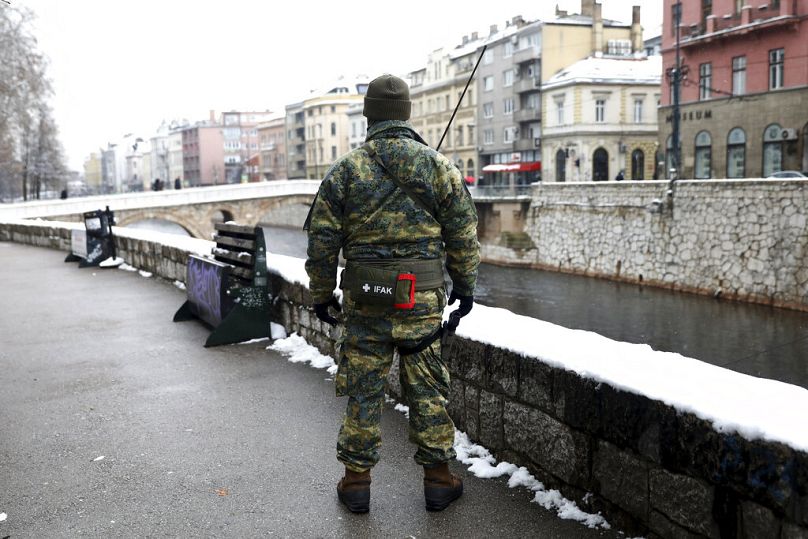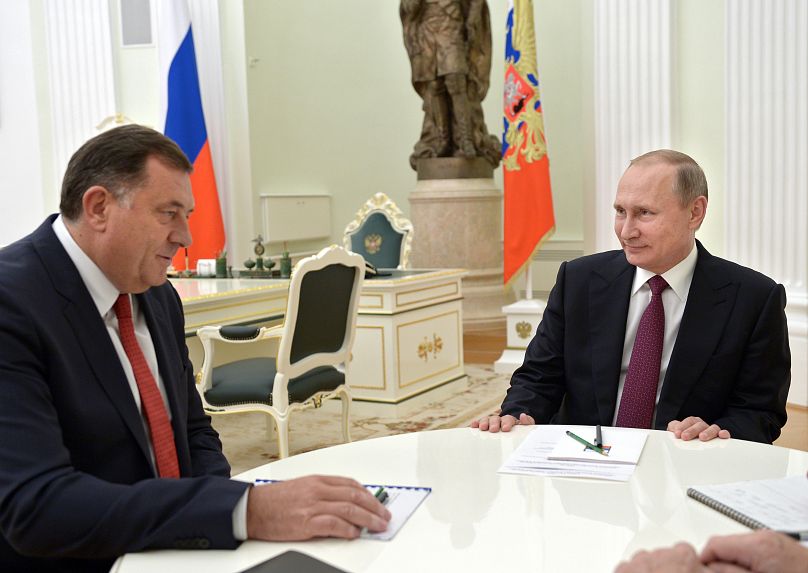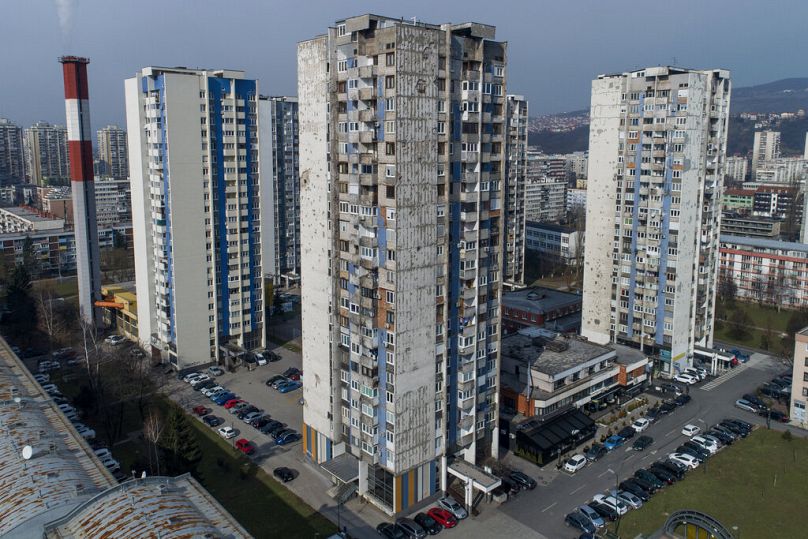Bosnia is one of the few remaining countries in Europe that has not introduced any sanctions against Moscow for its invasion of Ukraine.
Bosnia remains one of the few European countries not to have introduced any sanctions against Russia after its invasion of Ukraine.
But unlike Serbia or Belarus, the country found itself split on the issue — a reflection of its internal political divisions.
While many domestic leaders are eager to condemn the Russian aggression, others are unwilling to give up on their close connections with the Kremlin.
The locking of horns over Ukraine has only exacerbated the months-long political crisis, thought to be the worst in the three decades since the country declared independence after the breakup of Yugoslavia.
“This is typical behaviour from the political quasi-elites in Bosnia,” Tanja Topić, a political analyst based in Banjaluka, told Euronews.
“It’s no secret that the political leadership of the Republika Srpska entity advocates a pro-Russian option,” she said.
“And it translates into open support for Russia not to get sanctioned, whereas the other half of Bosnia gives Ukraine its unconditional support, including for sanctions against Moscow.”
“But this part and parcel of the ‘normal’ state of political dysfunction within Bosnia,” Topić explained.
Debate over sanctions sees bickering turn into scandals
Bosnia’s recent history was marked by a bloody war that saw 100,000 casualties and two million people becoming either refugees or internally displaced in a country of 3.5 million.
Drafted to bring the war to an end, the US-sponsored Dayton Peace Accords created two main administrative units in Bosnia — the Serb-dominated entity of the Republika Srpska, or RS, and the Bosniak-Croat majority Federation of BiH.
The two entities were given some autonomy, with an umbrella state-level government and a three-way presidency — with each president representing one of the three main ethnic groups — and a council of ministers overseeing the country's main institutions, including the army, the judiciary, and tax administration.
The peace agreement created one of the most complicated political systems in the world, with a dizzying maze of jurisdictions enabling the country’s three main ethnic groups to drive domestic politics to a standstill anytime key decisions need to be made.
The Bosnian Serb strongman Milorad Dodik, considered to be one of the most nationalist politicians in the region, has recently ramped up the threat of RS secession from Bosnia, resulting in the country’s worst political crisis since the war.
Not hiding his close ties with the Putin regime in Moscow, he has been flat-out refusing to approve of any sanctions against Russia.
As one of the members of the presidency, Dodik has repeatedly rejected demands by the two others — the Bosniak member Šefik Džaferović and the current chairman of the body, Bosnian Croat member Željko Komšić — to implement the existing sanctions passed in 2014 when Russia first attacked Ukraine.
Džaferović and Komšić claim that the decision and the Stabilisation and Association Agreement that the country has signed with the European Union in 2010 make it obligatory for Bosnia to align itself with the bloc on all security-related matters.
Dodik rejected this, claiming that new decisions have to be made on a case-by-case basis. Komšić, however, instructed the foreign affairs ministry to follow the EU’s lead despite not having the approval of the presidency, causing further bickering.
Amidst several attempts to find a common stance between the various government actors, Dodik also managed to create additional public scandals.
He personally asked for a call with Russian foreign minister Sergey Lavrov to discuss “economic cooperation” right after the first round of Western sanctions was passed on 28 February.
Then, he commented on the comparison British Prime Minister Boris Johnson made on 2 March, stating that the shelling of civilian targets in Ukraine reminds him of similar attacks on the Bosnian capital Sarajevo in the 1990s. Dodik said that the comparison only stands “if by that he meant the armed gangs seen walking around Kyiv today.”
Dodik also went after the country's top diplomat, accusing the Minister of Foreign Affairs Bisera Turković of being an "unguided missile exploding around the world" at a press conference following a failed attempt by the presidency to agree on sanctions against Russia on 3 March.
"Mr Dodik, unfortunately, says a lot of baseless things," Turković told Euronews. "But I don't think we should politicise that at the moment. I think we are living in a very serious moment in time where we should try to join forces and provide some sort of a guarantee of peace to the people who live in Bosnia."
The ministry plans to act in accordance with the existing agreements obligating the country to support EU stances, including the ones on restrictive measures, Turković stated, as having to vote on previously ratified agreements each and every time is senseless according to her.
"We have a situation where one member of the presidency is challenging the other two, trying to tear down everything that was done since the signing of the Dayton peace accords. It's clear that in any legal system — not just in Bosnia — those actions are neither acceptable nor do they have any legal grounds," Turković stated.
Dodik responded to criticism of his stances, stating at a press conference on Friday that "Russian people are good people [with] strong history and culture" while the "Russian state is very important, energy-wise".
"If there's anything strange — and everything is strange when it comes to Bosnia — it is that because of the actions of one Milorad Dodik and his lack of desire to join in on the rage and hysteria against the Russians, the Russian Federation did not blacklist Bosnia to block its access to energy sources."
'Disappointed, powerless, defeated'
As the war in Ukraine enters its fourth week, the Bosnian government is still nowhere near an agreement on what to do, and not just in terms of sanctions.
A proposed discussion on humanitarian aid at the state-level parliament failed last Friday due to a boycott by Bosnian Serb MPs, but also an abstention by the Bosnian Croat representatives, while the country also has no official plan on whether it will take in any refugees fleeing the conflict.
The airspace of the small Western Balkan nation of 3.5-million also remains open for Russian-owned or operated aircraft, despite the fact that there are no direct flights between the two countries.
The ministry of foreign affairs ordered the agency in charge of the country's airspace to shut it down for Russian flights, but the agency relegated the decision back to the presidency.
The latest vote in the Council of Europe calling for Russia to withdraw from the continent's main human rights organisation saw all five Bosnian representatives abstain, despite earlier votes in favour of condemning the Russian invasion at the body and the UN General Assembly.
Semir Hambo, editor-in-chief of Bosnia's most popular online outlet Klix, told Euronews that the political navel-gazing is effectively suffocating the country and its society, which feels responsible to act since it went through a similar traumatic experience in recent history.
Despite some individual efforts to collect aid or host refugees, most people feel frustrated by the country's lack of unified, systemic response.
"The lack of decisiveness reflects badly on the citizens themselves," he said. "Your average person feels reluctant. The people believe that this country should have been the first to condemn the aggression and the war."
"As a person, I am disappointed," Hambo said. "As a journalist who has to deal with these issues every day, I feel powerless, or even defeated."
"Despite a number of appeals and criticism that things must change, we still have to deal with matters that are absurd in most other countries in the world. "














